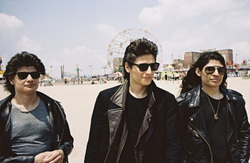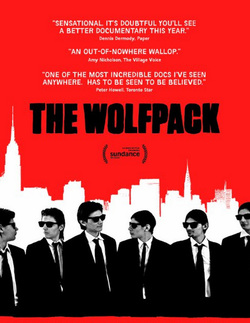
Cast & Crew
A Documentary Directed by Crystal Moselle
Featuring Bhagavan Angulos, Krsna Angulos, Jagadisa Angulos,
Mukunda Angulos, Govinda Angulos and Narayana Angulos
Rated R Running time: 84 minutes
A Documentary Directed by Crystal Moselle
Featuring Bhagavan Angulos, Krsna Angulos, Jagadisa Angulos,
Mukunda Angulos, Govinda Angulos and Narayana Angulos
Rated R Running time: 84 minutes
Reviewed by Kenneth Turan – LA Times
“The Wolfpack" is very much the documentary of the moment, showered with all kinds of media attention. And no wonder.
Winner of Sundance's Grand Jury Prize, it tells a story irresistible to our age of rampant voyeurism and reality TV, yet it also has a potent emotional core that cannot be denied. Even in the context of Tolstoy's famous dictum that every unhappy family is unhappy in its own way, the story of the Angulo brothers stands out.
It's been nearly five years since filmmaker Crystal Moselle first encountered the six striking-looking teenage siblings, their long straight hair in perpetual ponytails, on the streets of New York's East Village. She chased them down, struck up a conversation and slowly got to know them and their situation in the course of recording hundreds of hours of interviews and conversations.
As it turned out, the brothers were especially keen to talk to Moselle because she was a director. Huge movie buffs, they had access to a family film library of something like 5,000 titles. In fact, the argument could be made that movies were essential in saving their lives.
For the brothers, their developmentally challenged sister and their mother, Susanne, lived in a public housing apartment on the Lower East Side under the domineering thumb of father and husband Oscar, who had forbidden them from going out of the apartment by themselves. Sometimes, one of the brothers says, an entire year would go by without the siblings (home schooled by their mother) leaving the rooms they lived in.
Under those conditions, it was not surprising that the brothers, all given Sanskrit names by their Hare Krishna parents and not clearly identified in the film, invested so much of their time and interest in the movies, in effect their only access to the world.
"If I didn't have movies, life would be pretty boring, there wouldn't be any point to go on," one brother says. Another adds, "It makes me feel like I'm living, sort of, because it's kind of magical a bit."
The Angulos were hardly passive consumers of media. Fans of violent films like "Reservoir Dogs," "Pulp Fiction" and "The Dark Knight," they used their considerable free time to type word-for-word scripts of their favorites, and then they acted out the dramas in their apartment, using realistic guns and costumes made from castoff materials.
Though it is not immediately clear as "The Wolfpack" unfolds, filmmaker Moselle had encountered the siblings a little more than a year after Mukunda, not the oldest brother but clearly the leader, had become the first to go outside the apartment on his own. The fact that he wore a mask like Michael Myers in "Halloween" frightened local shopkeepers, police were called and the confinement system began to break down.
Moselle had access to a trove of Angulo family home movies (and has added some Manhattan street footage of her own), but the heart of the film remains her intimate interviews, the kind you can only get if you put in the time.
One of "The Wolfpack's" most poignant voices belongs to mother Susanne, an American woman from the Midwest who met Peruvian Oscar on the Inca Trail to Machu Picchu. They shared values, she says, including a distrust of materialism, and she appreciated that he was "somebody who sees things in a different way," though just how different was something she did not anticipate.
Moselle finally speaks to father Oscar as well and gets to hear his side of the story, his justification for acting the way he did, delivered at a time when the power dynamic in the family is changing and the brothers are asserting their independence.
Although no one would recommend the childhood experience the Angulos endured, one of the story's fascinating aspects is how thoughtful and articulate the brothers have turned out, though a few of them have inevitably inherited their father's uneasiness with the outside world.
"The Wolfpack" by its nature invites conjecture about what it was exactly that saved these young men. Yes, their love of movies played a major part, but the human factor is also key. Several of the brothers credit Susanne ("It's because of our mother, she kept our sanity," says one), and in a sense they saved themselves. The sibling bond on display is remarkable, and it has served them well.
“The Wolfpack" is very much the documentary of the moment, showered with all kinds of media attention. And no wonder.
Winner of Sundance's Grand Jury Prize, it tells a story irresistible to our age of rampant voyeurism and reality TV, yet it also has a potent emotional core that cannot be denied. Even in the context of Tolstoy's famous dictum that every unhappy family is unhappy in its own way, the story of the Angulo brothers stands out.
It's been nearly five years since filmmaker Crystal Moselle first encountered the six striking-looking teenage siblings, their long straight hair in perpetual ponytails, on the streets of New York's East Village. She chased them down, struck up a conversation and slowly got to know them and their situation in the course of recording hundreds of hours of interviews and conversations.
As it turned out, the brothers were especially keen to talk to Moselle because she was a director. Huge movie buffs, they had access to a family film library of something like 5,000 titles. In fact, the argument could be made that movies were essential in saving their lives.
For the brothers, their developmentally challenged sister and their mother, Susanne, lived in a public housing apartment on the Lower East Side under the domineering thumb of father and husband Oscar, who had forbidden them from going out of the apartment by themselves. Sometimes, one of the brothers says, an entire year would go by without the siblings (home schooled by their mother) leaving the rooms they lived in.
Under those conditions, it was not surprising that the brothers, all given Sanskrit names by their Hare Krishna parents and not clearly identified in the film, invested so much of their time and interest in the movies, in effect their only access to the world.
"If I didn't have movies, life would be pretty boring, there wouldn't be any point to go on," one brother says. Another adds, "It makes me feel like I'm living, sort of, because it's kind of magical a bit."
The Angulos were hardly passive consumers of media. Fans of violent films like "Reservoir Dogs," "Pulp Fiction" and "The Dark Knight," they used their considerable free time to type word-for-word scripts of their favorites, and then they acted out the dramas in their apartment, using realistic guns and costumes made from castoff materials.
Though it is not immediately clear as "The Wolfpack" unfolds, filmmaker Moselle had encountered the siblings a little more than a year after Mukunda, not the oldest brother but clearly the leader, had become the first to go outside the apartment on his own. The fact that he wore a mask like Michael Myers in "Halloween" frightened local shopkeepers, police were called and the confinement system began to break down.
Moselle had access to a trove of Angulo family home movies (and has added some Manhattan street footage of her own), but the heart of the film remains her intimate interviews, the kind you can only get if you put in the time.
One of "The Wolfpack's" most poignant voices belongs to mother Susanne, an American woman from the Midwest who met Peruvian Oscar on the Inca Trail to Machu Picchu. They shared values, she says, including a distrust of materialism, and she appreciated that he was "somebody who sees things in a different way," though just how different was something she did not anticipate.
Moselle finally speaks to father Oscar as well and gets to hear his side of the story, his justification for acting the way he did, delivered at a time when the power dynamic in the family is changing and the brothers are asserting their independence.
Although no one would recommend the childhood experience the Angulos endured, one of the story's fascinating aspects is how thoughtful and articulate the brothers have turned out, though a few of them have inevitably inherited their father's uneasiness with the outside world.
"The Wolfpack" by its nature invites conjecture about what it was exactly that saved these young men. Yes, their love of movies played a major part, but the human factor is also key. Several of the brothers credit Susanne ("It's because of our mother, she kept our sanity," says one), and in a sense they saved themselves. The sibling bond on display is remarkable, and it has served them well.






